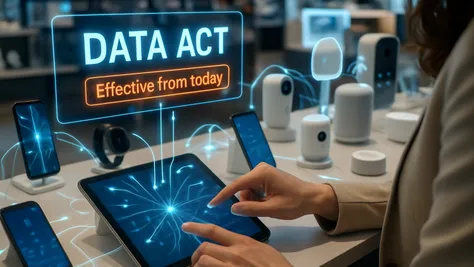In three months’ time, the European Data Regulation (Data Act) will enter into force, introducing brand new rules for the handling of data from smart devices with a view to strengthening Europe’s data economy. The Data Act is one of the key steps towards creating a single European market for data and making Europe more competitive in the digital world. The Regulation imposes a number of new obligations not only on manufacturers of smart devices, but also on sellers, rentors and lessors and other entities that offer ancillary or downstream services related to the use of these products. In a series of articles, we will look at the new obligations in more detail and offer suggestions on how to prepare for them.
While ownership and control over the use of traditional products is undoubtedly in the hands of the customer, this is not always the case with smart devices. Although the user is actively using the product, the data generated during its operation often remains out of their reach – typically under the control of the manufacturer. The new European Data Regulation (known as the Data Act) addresses this imbalance, introducing uniform rules for access to data generated by smart devices and related services.
The holders of this data – usually the manufacturers themselves – will now be obliged to make it available on request not only to users but also to other authorised entities. The Regulation applies to manufacturers and also to those who sell and/or finance smart devices or provide related digital services that enable control over some of the functions of those devices.
The Data Act will enter into force on 12 September 2025, exactly three months from now. As this is a directly applicable legal regulation, there is no need for its implementation into the Czech legal system, similar to the GDPR. As of that date, smart device manufacturers and vendors will be required to comply with certain obligations. At the same time, however, it will be necessary to adapt Czech legislation, which will determine, for example, the competences of the supervisory authority and provide for measures for non-compliance with the Regulation.
Which products will be affected by the Data Act?
The Data Act significantly strengthens the rights of users of smart devices (so-called connected products) by granting them the right to access readily available data generated by these devices. Pursuant to the Regulation, a “connected product” is understood to mean a physical device capable of collecting or generating data concerning its use or environment and subsequently sharing such data – whether through a dedicated application interface or physical connection.
Typical examples of connected products include connected vehicles, smart homes, medical and fitness devices, and industrial and agricultural machinery. Users of these devices now have significantly more control over the data generated during their operation.
The Data Act applies to new connected products placed on the market after 12 September 2025 but also affects devices already on the market – including those that are resold as used (i.e. second-hand sale). The rights to the data are thus automatically transferred to any subsequent owner or user, regardless of whether the sale is a first or subsequent sale.
What obligations does the Data Act impose on smart device manufacturers?
The Data Act places a number of new obligations on smart device manufacturers to ensure more transparent and fairer access to the data generated by these devices.
Manufacturers, as data holders, will have to:
- make the data from the device available to users without undue delay, free of charge and in a format that allows its further use;
- where technically feasible, ensure that the data is directly accessible to the user without the need to interact with the manufacturer, and other data at the user’s request;
- establish a mechanism for sharing data with a third party designated by the user.
From the date of applicability of the Regulation, i.e. September 2025, the above obligations for manufacturers will not apply to all data generated by smart devices, but only to data that is “readily available”. That is, data created by the device itself, which is technically accessible without disproportionate effort going beyond a normal, simple operation. However, from 12 September 2026, the Data Act makes it mandatory for manufacturers to design their devices so that all data generated by the device is readily available.
Information duty of sellers, rentors and lessors for connected products and related services
The Data Act applies not only to the manufacturers of smart devices themselves, but also to a wide range of other entities involved in supplying, renting or operating related smart services. One of the key obligations introduced by the Regulation for these entities is the obligation to provide users – before entering into a contract of sale, rental or lease – with clear and transparent information on:
- the type, format and estimated volume of data the device is capable of generating;
- whether the device generates data continuously and in real time;
- whether the device stores data locally or on a remote server, and the intended retention period;
- how the user can access, retrieve or, where appropriate, delete the data, including the technical means, the conditions of use and the quality of the related services.
This information should be available to customers, for example, via a stable link to a website or a QR code.
Are you ready for the upcoming applicability of the Data Act?
With only a few months to go before the Data Act becomes directly applicable, it is high time to start preparing for the new obligations. Smart device manufacturers must clearly define what data their products generate, which of it is readily available, and how users will be able to access it. Sellers, rentors, lessors, and smart service providers must ensure that they get all the information they need from manufacturers and that they present it to customers in a clear and understandable way before entering into the contract.
The Data Act will impact most smart device sales – from e-commerce to retail to automotive. If the new obligations apply to you, we will be happy to help you implement them.









